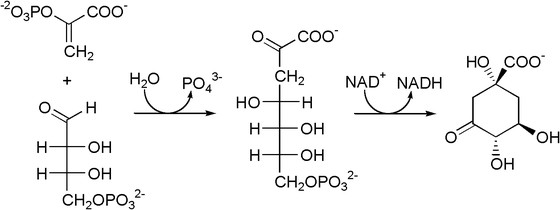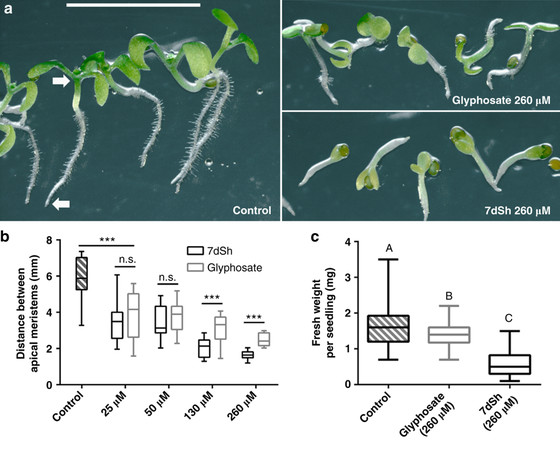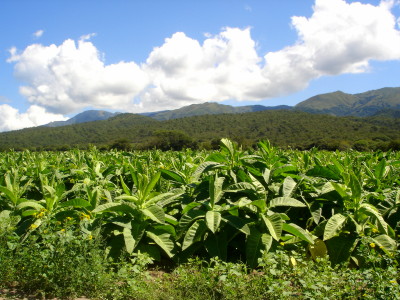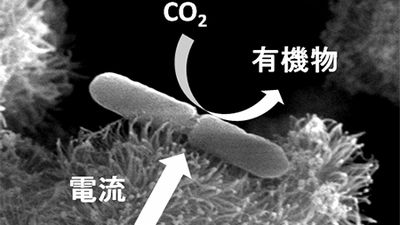We found out that rare sugar collected from microorganisms living for 3 billion years ago acts as a natural herbicide

The herbicide ingredient " glyphosate " developed in 1970 has been used throughout the world for nearly half a century, but recently it is a problem that weeds that are resistant to glyphosate are increasing. Therefore, scientists from all over the world are pursuing alternative herbicidal ingredients to glyphosate. Meanwhile, researchers at Eberhard Karl University TUBINGEN discovered that rare sugars synthesized from cyanobacteria ( cyanobacteria ) have herbicidal action.
Cyanobacterial antimetabolite 7-deoxy-sedoheptulose blocks the shikimate pathway to inhibit the growth of prototrophic organisms | Nature Communications
https://www.nature.com/articles/s41467-019-08476-8
Unusual sugar from cyanobacteria acts as natural herbicide
https://phys.org/news/2019-02-unusual-sugar-cyanobacteria-natural-herbicide.html
Cyanobacteria, an aerobic prokaryote, is known for performing " photosynthesis " that generates oxygen and saccharides from carbon dioxide and water in the air by converting light energy into chemical energy, and the plant has The idea that chloroplasts are the result of symbiosis of cyanobacteria within cells has become an established theory. It is also said that cyanobacteria produced atmospheric composition close to the present by generating oxygen from about 2.7 billion to 3.5 billion years ago.

A research team at Eberhardt Carl University isolated a rare deoxysugar 7-deoxysed heptulose (7 dSh) monosaccharide from a culture of cyanobacteria (Synechococcus elongatus) inhabiting freshwater, and its molecular structure Has been identified.

Normally, saccharides are used as energy for growth, but 7 dSh acts as a metabolic antagonist ( fertility ) agent , and the enzyme 3 - dehydroquinic acid synthase used in the shikimate pathway that biosynthesizes aromatic amino acids (DHQS) that was found to inhibit the work.
The shikimate pathway biosynthesizes phenylalanine and tryptophan , which are extremely important amino acids for organisms, so that when it is inhibited, the growth itself of the organism is also inhibited. Also, although most of plants and microorganisms have this shikimate pathway, they do not have animals. Therefore, by inhibiting this shikimate pathway, it is possible to suppress the growth of plants while minimizing the influence on animals.

The following image shows the growth experiment of Arabidopsis thaliana , an autotrophic organism. Among the three photographs, the left is a comparative control group grown on an agar plate not containing an antimetabolite, the one raised on the agar plate containing glyphosate on the upper right, the one raised on the agar plate containing the lower right by 7 dSh It is. The Arabidopsis thaliana given 7 dSh was sufficient to say that the growth was inhibited as the stem elongation and weight were obviously reduced as with glyphosate. In addition, when compared with the same amount of glyphosate, it was also found that the influence of inhibition appeared more strongly when 7 dSh was given.

Glyphosate, a herbicidal ingredient that has been in use for nearly 50 years, inhibits the enzyme 3-phosphoshimic acid 1-carboxyvinyltransferase , which is used in the shikimate pathway. Of course glyphosate dies plants indiscriminately, so genetically modified crops resistant to glyphosate were also being studied in the United States. However, by being multiplied with these genetically modified crops, weeds called " superweed " having glyphosate tolerance were born, which became a serious problem. Therefore, a new herbicide that replaces glyphosate was sought.
Since 7dSh discovered this time inhibits the shikimate pathway like glyphosate, it can be expected as a highly safe "post glyphosate" without affecting animals. In addition, 7 dSh is a naturally occurring sugar, it has a higher degradability compared to glyphosate, and it is also a big point that the survivability is low. Klaus Brilisauer, one of the research team, who works for the Organic Chemistry Institute at Tabingen at Eberhard Karl University, said, "The newly discovered deoxysugar is a contrasting substance to glyphosate and has a complete degradation and low ecotoxicity We are a natural product, we got a great opportunity to use it as a natural herbicide. "
7 dSh is expected to solve the problem of glyphosate tolerance, health damage of herbicides and environmental pollution problems, but since it has just been successfully isolated and has not been subjected to long-term operational experiments, Further investigation is awaited as to the degradability in the soil and whether there is no harm to livestock or humans.
Related Posts:







